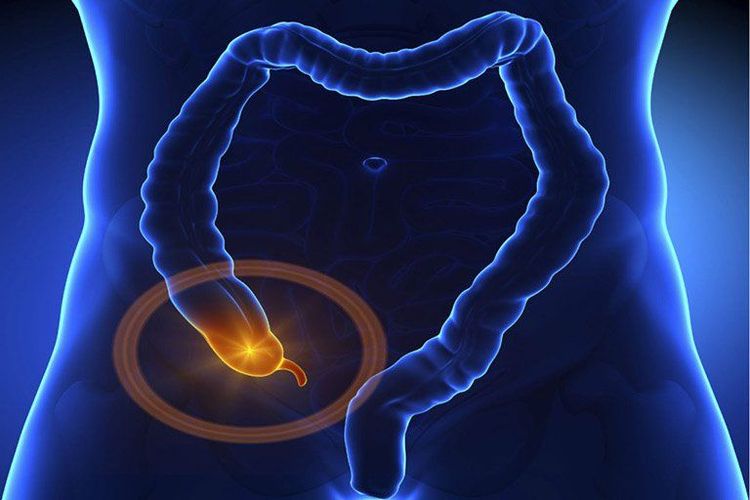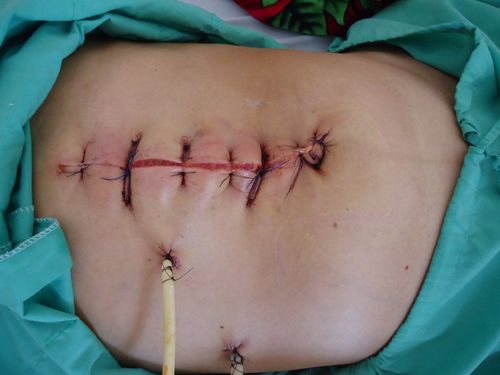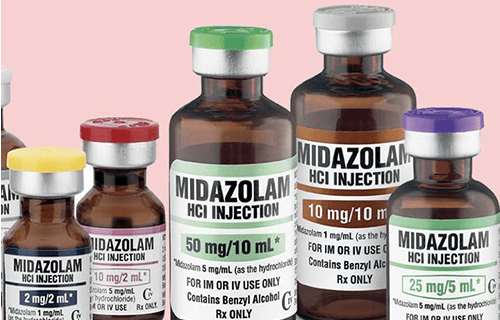This is an automatically translated article.
The article was professionally consulted by Specialist Doctor I Ho Quoc Tuan - Anesthesiologist - General Surgery Department - Vinmec Nha Trang International General Hospital. Doctor Quoc Tuan has many years of experience in the field of Anesthesia - Resuscitation.Anesthesia in gastrointestinal surgery patients is a combination of drugs intended to put the patient into a sleep-like state prior to surgery. Under general anesthesia, because the patient's brain will not respond to pain signals or reflexes, the patient will not feel pain during digestive surgery.
1. When does a patient need gastrointestinal surgery?
Gastrointestinal surgery is a treatment for diseases of the parts of the body involved in digestion, including the esophagus, stomach, small intestine, large intestine, rectum, liver, gallbladder, and pancreas.Gastrointestinal surgery can be used to remove cancerous or noncancerous tumors or part or all of a damaged organ. In addition, surgery can also be used to repair certain problems such as an abdominal hernia. Besides, minor surgery or minor surgery is applied to screen and diagnose diseases of the digestive system.
Below are gastrointestinal conditions that can be treated with surgery and may require anesthesia:
Appendicitis . Because the appendix became infected and inflamed, the doctor had to surgically remove it. Colon cancer and other gastrointestinal cancers. Surgery is done to remove cancerous tumors in the digestive system and other parts of the digestive system that are cancerous. Diverticulosis disease. Diverticula are small pouches that form in the large intestine. Doctors still don't know what causes diverticula to form, but sometimes they can become more serious as inflammation and pain (diverticulitis). If you have diverticulitis, your doctor may recommend surgery to remove that portion of your bowel. Gallbladder disease. When there is a problem with the gallbladder, such as gallstones, the treatment is usually surgery to remove the gallbladder. Gastroesophageal reflux disease (GERD) and hiatal hernias. Abdominal wall hernia Inflammatory bowel disease (Crohn's disease and ulcerative colitis). With inflammatory bowel disease, the patient's own immune system attacks the intestines, causing pain and inflammation. Due to damage to the intestines, the doctor had to operate to remove the damaged intestine and reconnect the normal parts of the intestine. Rectal Prolapse Weight loss.

2. Advantages and disadvantages of digestive surgery anesthesia
Advantages of gastrointestinal anesthesiaThe patient will sleep completely during the operation. When anesthesia will not have a limit on the time of general anesthesia, this will facilitate doctors to perform lengthy surgeries, requiring a lot of time in the operating room to handle the problem. patient subject. If local anesthesia only works on a specific area on the patient, then general anesthesia will allow the doctor to perform treatment/surgery on many parts of the body at the same time. Allows muscles to relax for long periods of surgery Ease of administration and reversal of anesthesia Cons of gastrointestinal surgery anesthesia
General anesthesia is not suitable for every patient General anesthesia may be experienced some risks, and this risk increases when a person has pre-existing heart disease or chronic lung disease. Possible risks include an increased risk of deep vein thrombosis, which causes more blood loss. The patient may have to be intubated for anesthesia, so when he wakes up, he will have a sore throat and hoarse voice for a few days. Other side effects such as headache, nausea, and drowsiness are also common after surgery
3. Factors that increase the risk of complications during anesthesia for gastrointestinal surgery
In most cases, general anesthesia is generally very safe, and even people with serious medical conditions can administer general anesthesia on their own without any serious problems.In fact, a patient's risk of complications is more closely related to the type of surgery a patient is having and overall health, and not to the anesthetic problem.
In the elderly or those with serious medical conditions, especially those undergoing major surgery, the patient is at risk of postoperative confusion, pneumonia or even stroke and heart attack. Factors that increase the risk of complications during surgery, if the patient has:
Smoking Convulsions Trouble breathing while sleeping Obesity High blood pressure Diabetes Stroke Other conditions related to the heart, lungs or kidney Drugs, such as aspirin, can increase bleeding Severe alcohol addiction Drug allergy The surgical technique of anesthesia is very important, directly affecting the surgical process, the surgical efficiency, the rate of the patient's postoperative recovery and future health. Therefore, a team of highly qualified and experienced anesthesiologists is very important.

References: mayoclinic.org, intermountainhealthcare.org
Please dial HOTLINE for more information or register for an appointment HERE. Download MyVinmec app to make appointments faster and to manage your bookings easily.














